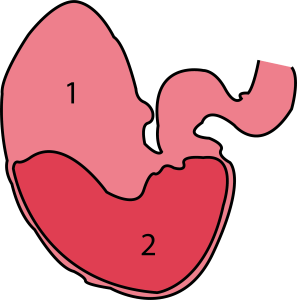Stomach ulcers in horses are common but often overlooked problems that can significantly affect equine health and performance. They can occur in all horses, recreational horses, broodmares and even young foals, but primarily in sport horses.
What are stomach ulcers?
Gastric ulcers are lesions or ulcers that develop in the lining of the stomach. They occur because the stomach lining becomes damaged by excessively acidic stomach contents. This can also cause gastritis. They can occur in (1) the squamous mucosa (the upper, non-glandular part of the stomach) or (2) the glandular mucosa (the lower, glandular part).

Causes of gastric ulcers in horses
One of the main causes is prolonged exposure to stomach acid, which can damage the protective layer of the stomach. This can be exacerbated by several factors:
Prolonged periods without feed
A horse makes stomach acid constantly. If a horse is deprived of feed for a long time, the stomach acid cannot be buffered. Then the stomach acid attacks the stomach wall and can promote the development of stomach ulcers. Therefore, it is very important that your horse receives roughage at regular intervals. An improper balance between roughage and concentrate can also cause stomach acid levels to become unbalanced.
Other feeding factors such as intermittent feeding, high sugar and starch intake, large amounts of straw as feed and prolonged time without access to feed have all been associated with an increased risk of stomach ulcers.
Increased stress levels
Intense training, competition and transportation can also promote gastric ulcers. Because they can increase stress levels in your horse, this can lead to decreased blood flow to the stomach lining. This can compromise the integrity of the mucosa and increase susceptibility to gastric ulcers.
What symptoms does a horse with an ulcer show?
Horses with gastric complications often suffer from the following symptoms:
- Reduced appetite
- Reduced performance
- Resistance while driving
- Poor, dull coat
- Grits
- Weight loss
- Reacting negatively to the girth
- Frequent yawning
- Change in behavior
It often happens that stomach ulcers are not immediately recognized because of various reasons:
Non-specific symptoms
Because the characteristics of stomach ulcers are vague and nonspecific, they often go unnoticed. Many of the signs of stomach ulcers can also occur with other health problems. As a result, symptoms are not immediately associated with stomach problems. Also, owners may attribute symptoms such as slight decreased performance or subtle changes in appetite to fatigue, overlooking the underlying problem.
Silent sores
Some horses can also have stomach ulcers without showing obvious symptoms, which are also called "silent ulcers. Indeed, horses are naturally inclined to tolerate minor discomforts without showing obvious signs, as in the case of stomach pain, for example. They can be difficult to detect without diagnostic tests such as a gastroscopy. As a result, these horses can go undetected and untreated for a long time, which can lead to serious complications in the long run.
How are peptic ulcers diagnosed?
Gastric ulcers are diagnosed by gastroscopy. This procedure involves inserting a flexible endoscope with a small camera on the end. This is passed through the horse's nose through the esophagus to the stomach to visualize the inside of the horse's stomach. This allows the veterinarian to inspect the stomach for signs of irritation, ulcers, inflammation and other abnormalities.
Because the symptoms of gastric ulcers are nonspecific, they can only be detected by gastroscopy. This method is excellent for diagnosing gastric ulcers, but it is not always practical or cost-effective to perform this procedure on every horse with suspected gastric problems.

How can you treat and prevent stomach ulcers?
Treatment of stomach problems usually includes a change in management and diet modification. Examples include increasing grazing time, providing access to feed throughout the day and reducing stressors. In many cases, the veterinarian will also recommend Omeprazole for treatment. This is an antacid that will largely block stomach acid production.
Prevention is better than cure! Global Medics has two powerful supplements that are going to support healthy stomach function:
Gastryl
Gastryl is specially formulated for horses with a sensitive stomach and any associated poor appetite. It contains several components that regulate acidity in the stomach, including magnesium hydroxide, Lithothamne, sodium bicarbonate and sodium citrate.
The supplement can be easily administered orally through the tube for efficient absorption. If needed, a course of Gastryl can be followed up with Gastro-Care+.
Gastro-Care+
Gastro-Care+ neutralizes excess stomach acid on the one hand and protects the stomach lining from irritation on the other. Thanks to the addition of glutamine and sodium bicarbonate, Gastro-Care+ accelerates the recovery of the damaged mucosa. Matricaria recutita and magnesium have a soothing effect on the gastrointestinal mucosa which relieves the unpleasant stomach feeling.
Gastro-Care+ has an extremely powerful and protective effect on the gastric mucosa and reduces the frequency of gastric complications in horses.
Tips to prevent stomach ulcers
- Provide your horse with adequate access to high-quality roughage to promote saliva production and buffer stomach acid.
- Make sure your horse has adequate pasture to have a constant supply to the stomach. If grazing is not possible, make sure you feed your horse small, frequent meals to mimic natural grazing behavior.
- Support healthy stomach function by giving your horse a supplement such as Gastryl or Gastro-Care+ offering.
Want to learn more about your horse's digestion? Then read our blog here.




